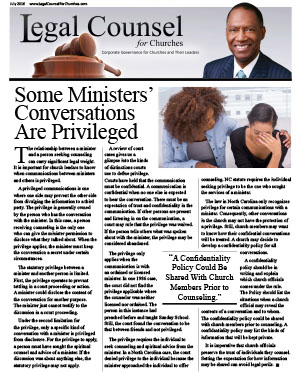From time to time, churches find it necessary to have meetings with their members. Membership meetings may be held to handle routine business, elect officers and/or plan for the future of the church. One of the keys to holding a successful and legal church meeting is to provide adequate notice. Notification requires a publication that a meeting will occur and what topics will be discussed at the meeting.
Generally, there are two kinds of church meetings: Annual/ Regular meetings and Special meetings. North Carolina law requires churches that have members with the right to vote for directors to hold annual member meetings. A church with members may hold regular membership meetings at the times stated in the bylaws. Annual and regular membership meetings may be held at the place provided in accordance with the bylaws. If no place is stated or fixed in regards to the bylaws, annual and regular meetings shall be held at the church’s principal office.
At annual and regular meetings, the members shall consider and act upon such matters as may be consistent with the notice requirements.
Churches may also hold special meetings. Special meetings can be for any purpose the church deems necessary. Special meetings may be called to seek the church body’s approval to purchase an asset, choose officials and amend bylaws or other matters.
There are two ways a special church meeting may be called. First, a church with members can hold a special meeting of members when the meeting is prompted by persons authorized to do so. Authorization to call a church meeting is commonly found in the articles of incorporation or bylaws.
Secondly, a special meeting can be called when at least 10% of members entitled to vote call for a meeting. North Carolina law provides that a written demand for a proposed special meeting must state the reason for the meeting, be signed, dated and delivered to the church’s secretary. If no place is stated or fixed in accordance with the bylaws, special meetings shall be held at the corporation’s principal office. Only those matters that are within the purpose or purposes described in the meting notice may be acted upon at a special meeting of members.
North Carolina law requires churches to give notice of membership meetings by any means that is fair and reasonable and consistent with its bylaws. So long as the bylaws do not prohibit it, notice can be by US Postal Service, electronic messages or announcements from the pulpit. NC law offers a safe harbor for notices that are to be considered fair and reasonable. These minimum requires include three elements.
First, a notice is fair and reasonable if the church gives notice to all members entitled to vote at the meeting the place, date, and time of each annual, regular, and special meeting of members no fewer than 10 days before the meeting. If the notice is mailed by other than first class, registered or certified mail, no fewer than 30, nor more than 60 days notice must be given before the meeting date.
Secondly, a notice is fair and reasonable if such notice of an annual or regular meeting includes a description of any matter or matters that shall be approved by the members.
Finally, a notice is fair and reasonable if the notice of a special meeting includes a description of the matter or matters for which the meeting is called.
There are situations where the church members can waive notice. In these instances, the members will allow a church meeting to continue without this formality. Members may waive any notice required by North Carolina law, the articles of incorporation, or bylaws before or after the date and time stated in the notice. The waiver shall be in writing, be signed by the members entitled to the notice, and be delivered to the church for inclusion in the minutes or filing with the corporate records. In addition, if a church member attends and participates in the meeting, the member waives the right to notice unless the member objects at the outset of the meeting or the raise of a particular matter.
Membership meetings are an important part of the corporate governance of a church. Church leaders can help ensure these meetings will go smoothly by providing adequate and legal notice.

